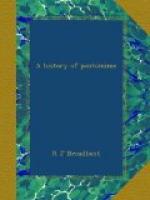It is only just to assign to Weaver the entire credit of being the first to introduce Pantomimes on the English stage, though the author’s original bent was “scenical dancing,” or ballet dancing, by representations of historical incidents with graceful motion. In his “History of Pantomimes” the author is careful to distinguish between those entertainments where “Grin and grimace usurp the passions and affections of the mind,” and those where “A nice address and management of the passions take up the thoughts of the performer.” “Spectators,” says Weaver, in 1730, or thereabouts, “are now so pandering away their applause on interpolations of pseudo-players, merry Andrews, tumblers, and rope dancers; and are but rarely touched with, or encourage a natural player or just Pantomime.”
It was, however, left to John Rich to place Pantomime on a firm footing. Before dealing with Rich and his Pantomimes, which I shall treat of in the next chapter, it is appropriate here to note how Pantomimes generally came to be introduced on the English stage.
Colley Cibber mentions:—About this time the patentee (Rich) having very near finished his house in Lincoln’s Inn Fields, began to think of forming a new company; and, in the meantime, found it necessary to apply for leave to employ them. By the weak defence he had always made against the several attacks upon his interests, and former Government of the theatre (Drury Lane), it might be a question, if his house had been ready, in the Queen’s (Anne) time, whether he would then have had the spirit to ask, or interest enough to obtain leave to use it; but in the following reign, as it did not appear he had done anything to forfeit the right of his patent, he prevailed with Mr. Craggs, the younger, to lay his case before the king, which he did in so effectual a manner that (as Mr. Craggs himself told me) his Majesty was pleased to say upon it, “That he remembered when he had been in England before, in King Charles’s time, there had been two theatres in London; and as the patent seemed to be a lawful grant, he saw no reason why two play-houses might not be continued.”
The suspension of the patent being thus taken off, the younger multitude seemed to call aloud for two play-houses! Many desired another, from the common notion, that two would always create emulation, in the actors. Others too were as eager for them, from the natural ill-will that follows the fortunate or prosperous in any undertaking. Of this low malevolence we had, now and then, remarkable instances; we had been forced to dismiss an audience of a hundred and fifty pounds, from a disturbance spirited up, by obscure people, who never gave any better reason for it than that it was their fancy to support the idle complaint of one rival actress against another, in their several pretensions to the chief part in a new tragedy. But as this tumult seemed only to be the wantonness of English liberty, I shall not presume to lay any further censure upon it.




